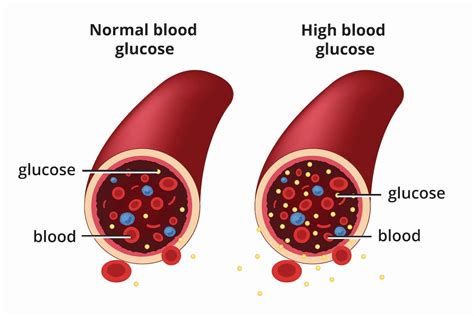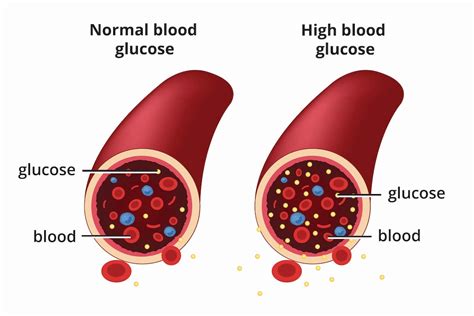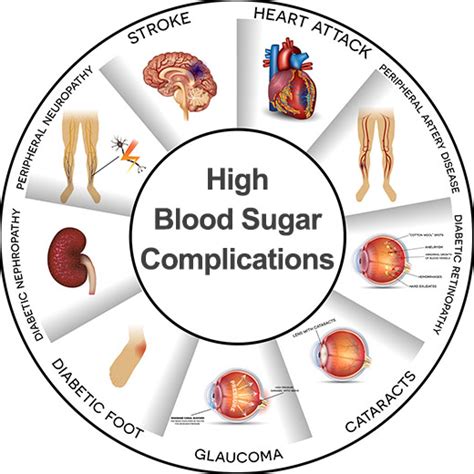Intro
Discover how high blood sugar affects overall health, causing damage to organs, nerves, and blood vessels, leading to diabetes complications, including heart disease, kidney failure, and vision loss, through uncontrolled glucose levels and poor blood sugar management.
High blood sugar, also known as hyperglycemia, is a condition that occurs when the body has too much glucose in the bloodstream. This can be a result of various factors, including a poor diet, lack of exercise, and certain medical conditions such as diabetes. When left unmanaged, high blood sugar can lead to a range of serious health complications. In this article, we will explore the importance of managing blood sugar levels and the potential risks associated with high blood sugar.
The human body relies on glucose as a primary source of energy, and it is normally regulated by the hormone insulin. However, when the body is unable to produce enough insulin or becomes resistant to its effects, glucose builds up in the bloodstream, leading to high blood sugar. This can cause damage to various organs and tissues, including the kidneys, nerves, and blood vessels. Furthermore, high blood sugar can also increase the risk of heart disease, stroke, and other cardiovascular conditions.
Managing blood sugar levels is crucial to preventing these complications and maintaining overall health. This can be achieved through a combination of lifestyle changes, such as a healthy diet and regular exercise, and medical treatments, such as insulin therapy and oral medications. By understanding the risks associated with high blood sugar and taking steps to manage it, individuals can reduce their risk of developing serious health complications and improve their quality of life.
Introduction to High Blood Sugar

Causes of High Blood Sugar
High blood sugar can be caused by a range of factors, including: * A poor diet that is high in sugar and refined carbohydrates * Lack of exercise or physical activity * Certain medical conditions, such as diabetes or polycystic ovary syndrome (PCOS) * Certain medications, such as steroids or certain psychiatric medications * Stress and anxietyEffects of High Blood Sugar on the Body

Short-Term Effects of High Blood Sugar
The short-term effects of high blood sugar can include: * Increased thirst and urination * Blurred vision * Fatigue and weakness * Headaches and dizziness * Nausea and vomitingLong-Term Effects of High Blood Sugar

Managing High Blood Sugar
Managing high blood sugar requires a combination of lifestyle changes and medical treatments. This can include: * Eating a healthy diet that is low in sugar and refined carbohydrates * Getting regular exercise, such as walking or jogging * Monitoring blood sugar levels regularly * Taking medications, such as insulin or oral medications, as prescribed by a doctor * Getting regular check-ups with a doctor to monitor health and adjust treatment as neededWays to Prevent High Blood Sugar

Importance of Early Detection and Treatment
Early detection and treatment of high blood sugar are crucial to preventing serious health complications. This can include: * Regular blood sugar monitoring * Regular check-ups with a doctor * Taking medications as prescribed by a doctor * Making lifestyle changes, such as eating a healthy diet and getting regular exerciseConclusion and Final Thoughts

Final Recommendations
Final recommendations for managing high blood sugar include: * Eating a healthy diet that is low in sugar and refined carbohydrates * Getting regular exercise, such as walking or jogging * Monitoring blood sugar levels regularly * Taking medications as prescribed by a doctor * Getting regular check-ups with a doctor to monitor health and adjust treatment as neededWhat are the symptoms of high blood sugar?
+The symptoms of high blood sugar can include increased thirst and urination, blurred vision, fatigue and weakness, headaches and dizziness, and nausea and vomiting.
How can I manage my blood sugar levels?
+Managing blood sugar levels can be achieved through a combination of lifestyle changes and medical treatments. This can include eating a healthy diet, getting regular exercise, monitoring blood sugar levels regularly, and taking medications as prescribed by a doctor.
What are the long-term effects of high blood sugar?
+The long-term effects of high blood sugar can include kidney damage and disease, nerve damage and neuropathy, cardiovascular disease and increased risk of heart attack and stroke, increased risk of infections and wounds that are slow to heal, and blindness and other vision problems.
We hope this article has provided you with a comprehensive understanding of high blood sugar and its effects on the body. If you have any further questions or concerns, please do not hesitate to comment below. Additionally, if you found this article informative, please share it with your friends and family to help spread awareness about the importance of managing blood sugar levels.
